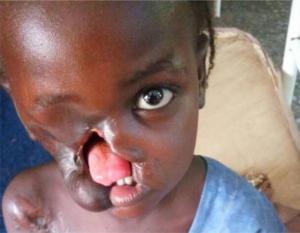Noma-Nigerian government and partners mobilize to fight the disfiguring disease
Abuja, June 25 2019 - “My daughter Aisha Ahmed, who is 5 years old had to undergo several surgeries at the Noma Children Hospital Sokoto to correct the defect on her face last year, says her mother, Hanatu Ahmed mentioned a resident of Sokoto, in North west geo-political zone of Nigeria
“It started with a small swelling on her right cheek which busted, and progressively increased in size until it covered a large part of her face.”
Just like Aisha Ahmed, an estimated 573 children with Noma were recorded, with patients mostly between the ages of two and six (Source: Children’s Hospital, Sokoto).
Noma, biologically called ‘cancrum oris’ borrows its name from the Greek term “to devour”. It is an infectious yet non-contagious disease that destroys soft and hard tissues on the face. Noma is mostly prevalent in rural communities and Noma patients are almost always from poor farming or nomadic households. Noma is therefore often described as “the face of poverty”.
Although exact cause remains unknown, predisposing factors include; malnutrition, poor oral hygiene, weak immune system, past history of measles, scarlet fever, typhoid and bacillary dysentery. Noma is also thought to be acquired by impoverished children through faecal contamination especially from shared residential facilities with animals. If left untreated, Noma is fatal in 70-90% of cases while survivors suffer severe facial disfigurement as well as difficulty speaking and eating. Noma survivors also face severe social stigma
According to Dr Alonge, the Head Oral Health Division at the Federal Ministry of Health, there are proven strategies that have been shown to reduce this burden They include, improved nutrition, exclusive breastfeeding in the first 6 months, immunizations and prioritization of poverty reduction strategies. In addition, increased level of awareness in the community and early health seeking behavior will contribute to the reduction.
Although Noma was common in developed countries in the nineteenth and twentieth Century, with improvement in standards of living, the disease has become rare. In contrast, Noma has remained an important problem especially along the Noma belt in Sub-Saharan Africa. The countries in this belt with the highest incidence of Noma and include; Chad, Ethiopia, Mali, Mauritania, Niger, Nigeria, Senegal and Sudan.
Clearing face of a disfiguring and debilitating disease
“As far back as 1994, the World Health Organization (WHO) declared Noma to be a public health issue. Hence, at the Forty-Eighth Session of the regional committee for the African Sub-Region held in Harare in 1998, a resolution was adopted calling for enhanced preventive and control measures against Noma”, said Dr Rex Mpazanje, of WHO in Nigeria.
“WHO’s strategy to fight against Noma has 5-prongs that include: prevention and early detection, immediate care, informing and educating the public, epidemiological data collection and creation of a referral center in each country for treating its after effects,” he added.
The Regional Noma Control Programme was relaunched in 2010 to mobilize further investments and support for countries with high prevalence of Noma within the African region. Nigeria joined the program in 2016, bringing the number of countries being supported to 10. Hilfsaktion Noma e.V, is the main supporting partner for the Nigerian Noma Control Program since 2013.
During last courtesy visit to Nigeria, Mr. Mathis Winkler, the Head of Projects, Hifskation Noma Ev reiterated, "Our organization has since 2013 provided technical support to the WHO AFRO region. So far 10 countries in Africa have benefited including Nigeria, and we will continue to support the Noma control program until the disease is eliminated."
Through this support, the country has a costed triennial action plan for Noma control through which training of service providers and public awareness activities are being supported including through annual commemoratory activities of the Noma Day. To mark the 2019 edition, the Sultan of Sokoto, His Eminence, Alhaji Muhammad Sa’ad Abubakar was conferred with the National Noma Champion title.
WHO continues to support the FMOH in Nigeria to foster strong collaboration for the ongoing Noma control efforts including beyond the health sector.



